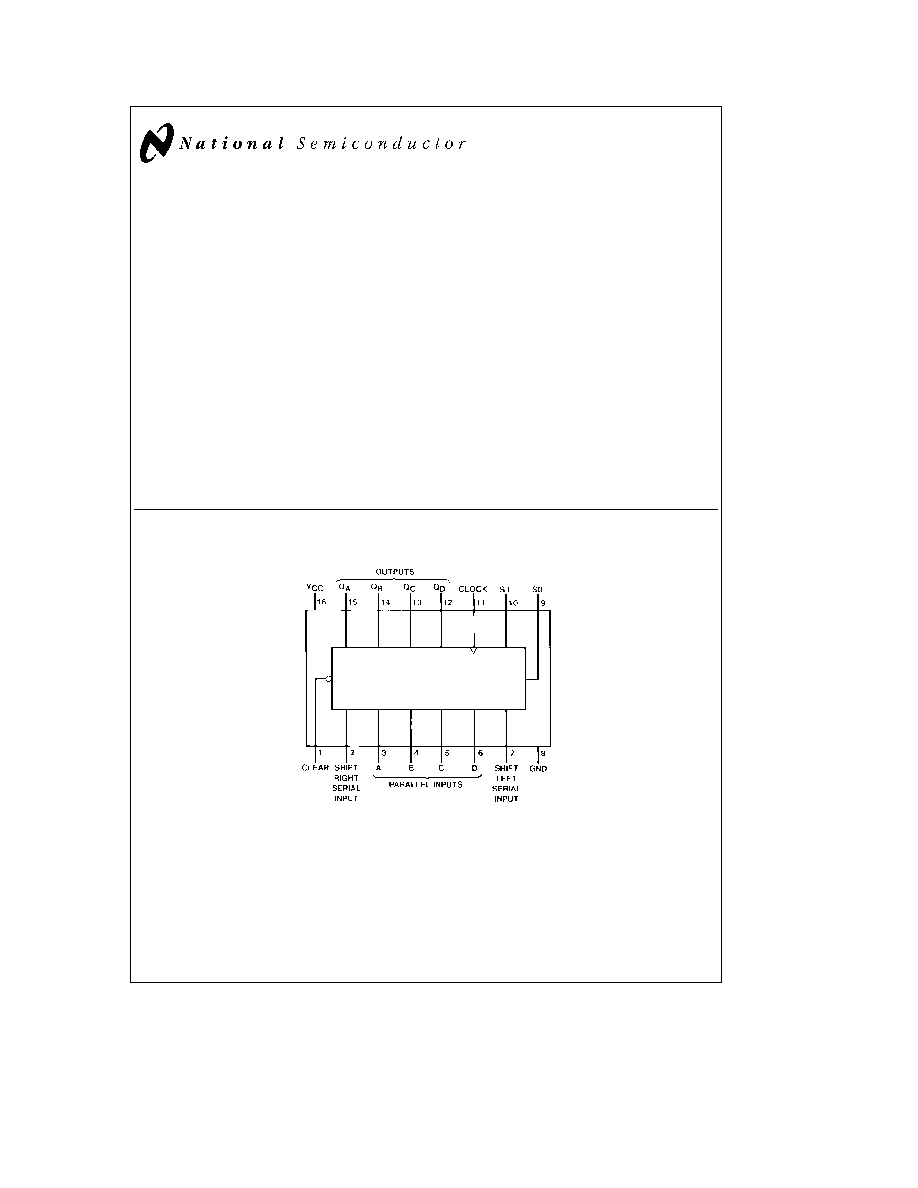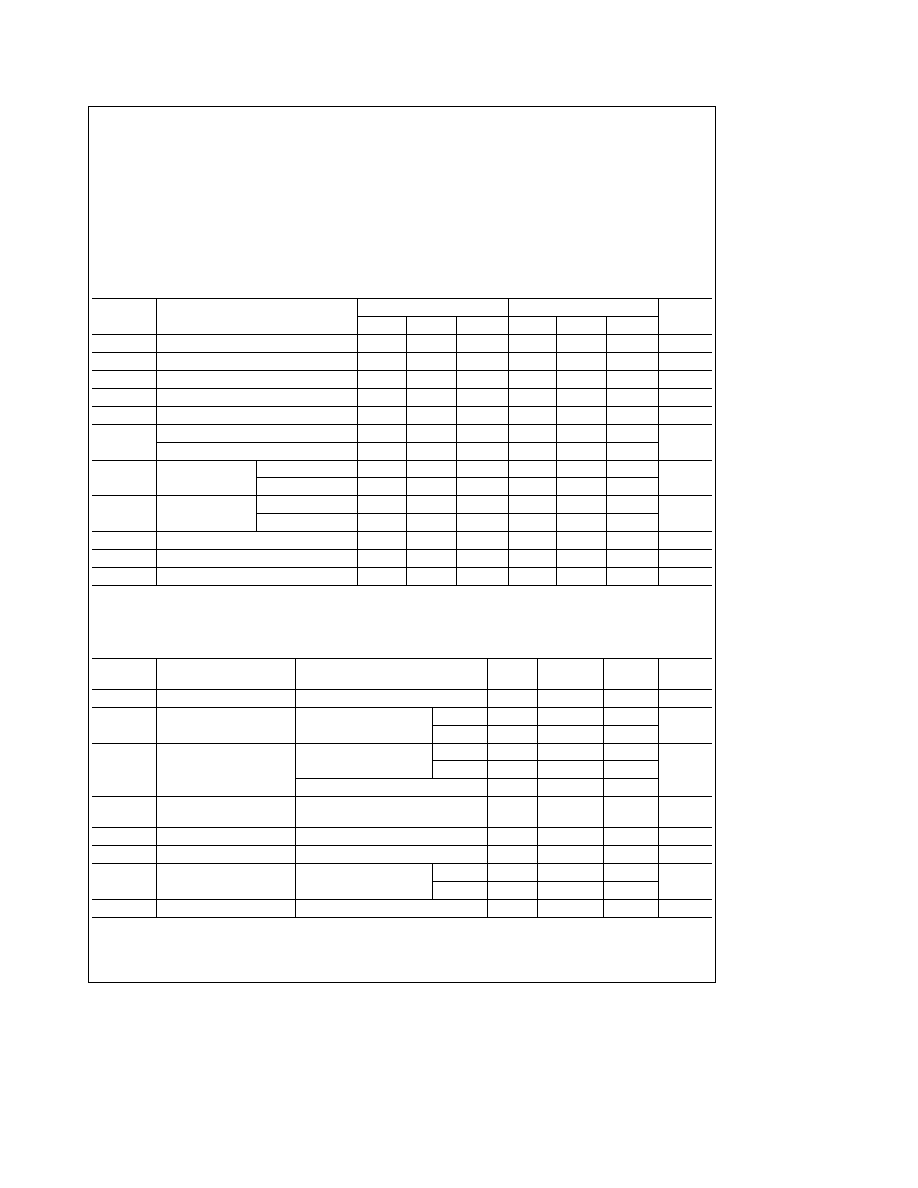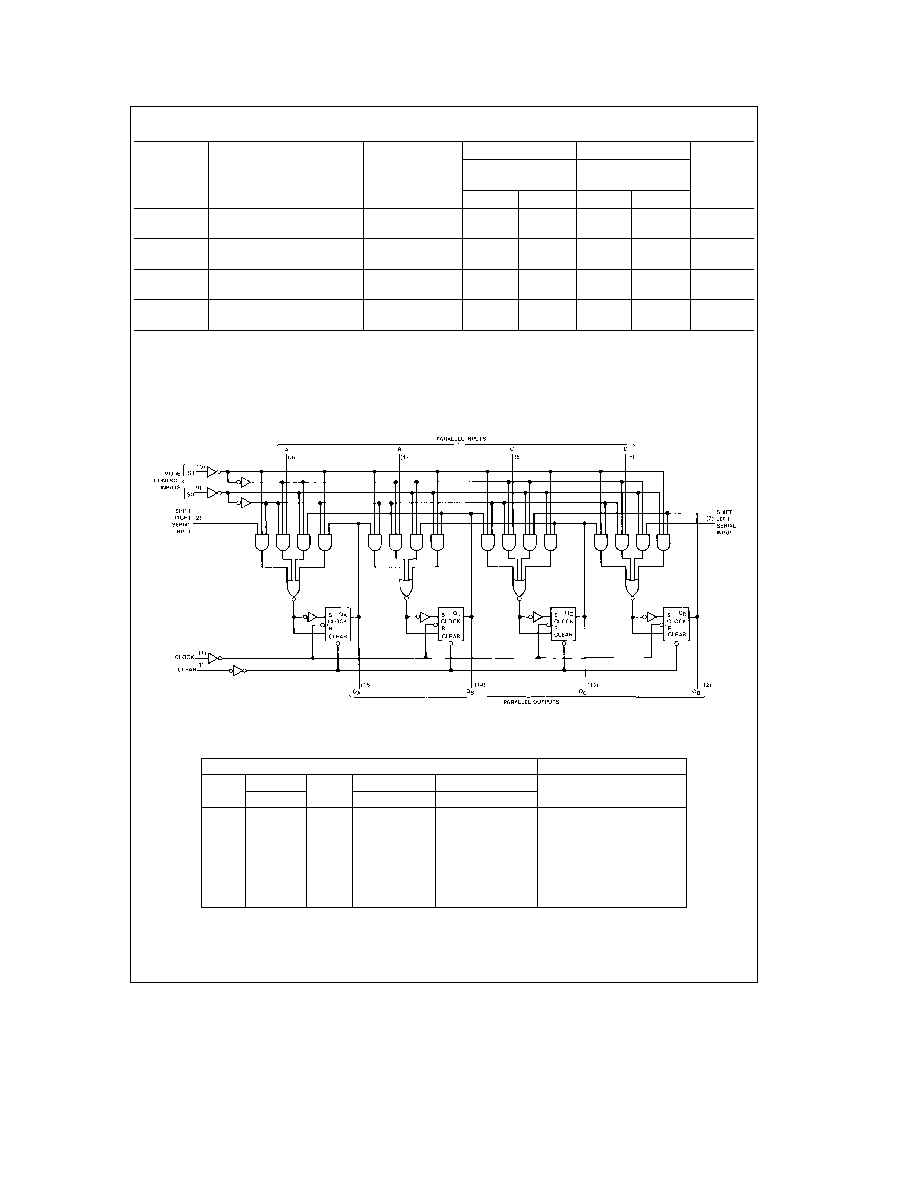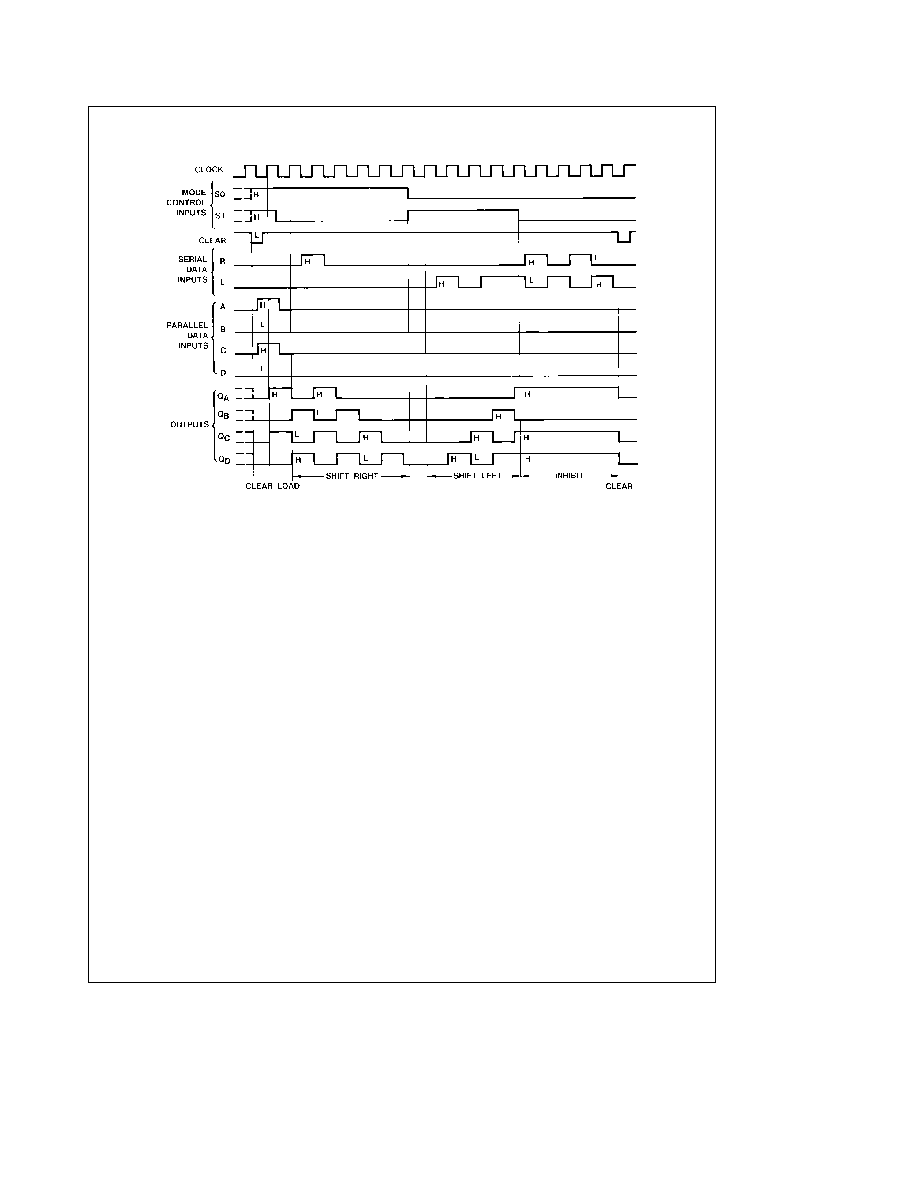
TL F 6407
54LS194ADM74LS194A
4-Bit
Bidirectional
Universal
Shift
Register
June 1989
54LS194A DM74LS194A 4-Bit
Bidirectional Universal Shift Register
General Description
This bidirectional shift register is designed to incorporate
virtually all of the features a system designer may want in a
shift register they feature parallel inputs parallel outputs
right-shift and left-shift serial inputs operating-mode-control
inputs and a direct overriding clear line The register has
four distinct modes of operation namely
Parallel (broadside) load
Shift right (in the direction Q
A
toward Q
D
)
Shift left (in the direction Q
D
toward Q
A
)
Inhibit clock (do nothing)
Synchronous parallel loading is accomplished by applying
the four bits of data and taking both mode control inputs S0
and S1 high The data is loaded into the associated flip-
flops and appear at the outputs after the positive transition
of the clock input During loading serial data flow is inhibit-
ed
Shift right is accomplished synchronously with the rising
edge of the clock pulse when S0 is high and S1 is low
Serial data for this mode is entered at the shift-right data
input When S0 is low and S1 is high data shifts left syn-
chronously and new data is entered at the shift-left serial
input
Clocking of the flip-flop is inhibited when both mode control
inputs are low
Features
Y
Parallel inputs and outputs
Y
Four operating modes
Synchronous parallel load
Right shift
Left shift
Do nothing
Y
Positive edge-triggered clocking
Y
Direct overriding clear
Connection Diagram
Dual-In-Line Package
TL F 6407 ≠ 1
Order Number 54LS194ADMQB 54LS194AFMQB
54LS194ALMQB DM74LS194AM or DM74LS194AN
See NS Package Number E20A J16A M16A N16E or W16A
C1995 National Semiconductor Corporation
RRD-B30M105 Printed in U S A

Absolute Maximum Ratings
(Note)
If Military Aerospace specified devices are required
please contact the National Semiconductor Sales
Office Distributors for availability and specifications
Supply Voltage
7V
Input Voltage
7V
Operating Free Air Temperature Range
54LS
b
55 C to
a
125 C
DM74LS
0 C to
a
70 C
Storage Temperature Range
b
65 C to
a
150 C
Note
The ``Absolute Maximum Ratings'' are those values
beyond which the safety of the device cannot be guaran-
teed The device should not be operated at these limits The
parametric values defined in the ``Electrical Characteristics''
table are not guaranteed at the absolute maximum ratings
The ``Recommended Operating Conditions'' table will define
the conditions for actual device operation
Recommended Operating Conditions
Symbol
Parameter
54LS194A
DM74LS194A
Units
Min
Nom
Max
Min
Nom
Max
V
CC
Supply Voltage
4 5
5
5 5
4 75
5
5 25
V
V
IH
High Level Input Voltage
2
2
V
V
IL
Low Level Input Voltage
0 7
0 8
V
I
OH
High Level Output Current
b
0 4
b
0 4
mA
I
OL
Low Level Output Current
4
8
mA
f
CLK
Clock Frequency (Note 1)
30
0
0
25
MHz
Clock Frequency (Note 2)
22
0
20
t
W
Pulse Width
Clock
17
20
ns
(Note 3)
Clear
12
20
t
SU
Setup Time
Mode
25
30
ns
(Note 3)
Data
16
20
t
H
Hold Time (Note 3)
0
0
ns
t
REL
Clear Release Time (Note 3)
18
25
ns
T
A
Free Air Operating Temperature
b
55
125
0
70
C
Note 1
C
L
e
15 pF T
A
e
25 C and V
CC
e
5V
Note 2
C
L
e
50 pF R
L
e
2 kX T
A
e
25 C and V
CC
e
5V
Note 3
T
A
e
25 C and V
CC
e
5V
Electrical Characteristics
over recommended operating free air temperature range (unless otherwise noted)
Symbol
Parameter
Conditions
Min
Typ
Max
Units
(Note 4)
V
I
Input Clamp Voltage
V
CC
e
Min I
I
e b
18 mA
b
1 5
V
V
OH
High Level Output
V
CC
e
Min I
OH
e
Max
54LS
2 5
V
Voltage
V
IL
e
Max V
IH
e
Min
DM74
2 7
3 4
V
OL
Low Level Output
V
CC
e
Min I
OL
e
Max
54LS
0 4
Voltage
V
IL
e
Max V
IH
e
Min
DM74
0 35
0 5
V
I
OL
e
4 mA V
CC
e
Min
0 4
I
I
Input Current
Max
V
CC
e
Max V
I
e
7V
0 1
mA
Input Voltage
I
IH
High Level Input Current
V
CC
e
Max V
I
e
2 7V
20
m
A
I
IL
Low Level Input Current
V
CC
e
Max V
I
e
0 4V
b
0 4
mA
I
OS
Short Circuit
V
CC
e
Max
54LS
b
20
b
100
mA
Output Current
(Note 5)
DM74
b
20
b
100
I
CC
Supply Current
V
CC
e
Max (Note 6)
15
23
mA
Note 4
All typicals are at V
CC
e
5V T
A
e
25 C
Note 5
Not more than one output should be shorted at a time and the duration should not exceed one second
Note 6
With all outputs open inputs A through D grounded and 4 5V applied to S0 S1 CLEAR and the serial inputs I
CC
is tested with momentary ground then
4 5V applied to CLOCK
2

Switching Characteristics
at V
CC
e
5V and T
A
e
25 C (See Section 1 for Test Waveforms and Output Load)
From (Input)
54LS
DM74LS
Symbol
Parameter
To (Output)
C
L
e
15 pF
C
L
e
50 pF
Units
R
L
e
2 kX
Min
Max
Min
Max
f
MAX
Maximum Clock
30
20
MHz
Frequency
t
PLH
Propagation Delay Time
Clock to
21
26
ns
Low to High Level Output
Any Q
t
PHL
Propagation Delay Time
Clock to
24
35
ns
High to Low Level Output
Any Q
t
PHL
Propagation Delay Time
Clear to
26
38
ns
High to Low Output
Any Q
Note 1
All typicals are at V
CC
e
5V T
A
e
25 C
Note 2
Not more than one output should be shorted at a time and the duration should not exceed one second
Note 3
With all outputs open inputs A through D grounded and 4 5V applied to S0 S1 CLEAR and the serial inputs I
CC
is tested with momentary ground then
4 5V applied to CLOCK
Logic Diagram
LS194A
TL F 6407 ≠ 2
Function Table
Inputs
Outputs
Clear
Mode
Clock
Serial
Parallel
Q
A
Q
B
Q
C
Q
D
S1
S0
Left
Right
A
B
C
D
L
X
X
X
X
X
X
X
X
X
L
L
L
L
H
X
X
L
X
X
X
X
X
X
Q
A0
Q
B0
Q
C0
Q
D0
H
H
H
u
X
X
a
b
c
d
a
b
c
d
H
L
H
u
X
H
X
X
X
X
H
Q
An
Q
Bn
Q
Cn
H
L
H
u
X
L
X
X
X
X
L
Q
An
Q
Bn
Q
Cn
H
H
L
u
H
X
X
X
X
X
Q
Bn
Q
Cn
Q
Dn
H
H
H
L
u
L
X
X
X
X
X
Q
Bn
Q
Cn
Q
Dn
L
H
L
L
X
X
X
X
X
X
X
Q
A0
Q
B0
Q
C0
Q
D0
H
e
High Level (steady state) L
e
Low Level (steady state) X
e
Don't Care (any input including transitions)
u
e
Transition from low to high level
a b c d
e
The level of steady state input at inputs A B C or D respectively
Q
A0
Q
B0
Q
C0
Q
D0
e
The level of Q
A
Q
B
Q
C
or Q
D
respectively before the indicated steady state input conditions were established
Q
An
Q
Bn
Q
Cn
Q
Dn
e
The level of Q
A
Q
B
Q
C
respectively before the most-recent
u
transition of the clock
3

Timing Diagram
Typical Clear Load Right-Shift Left-Shift Inhibit and Clear Sequences
TL F 6407 ≠ 3
4

5




